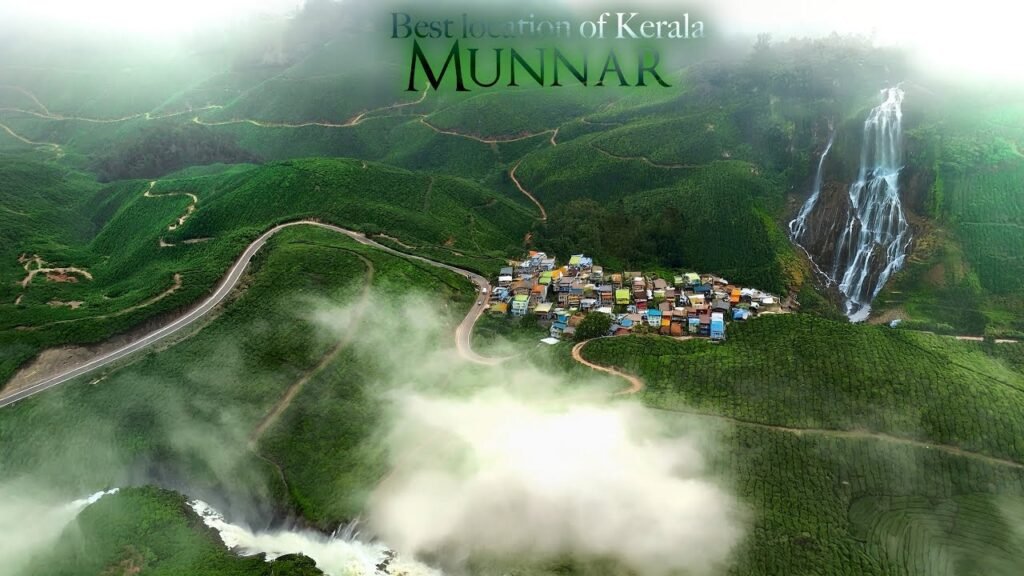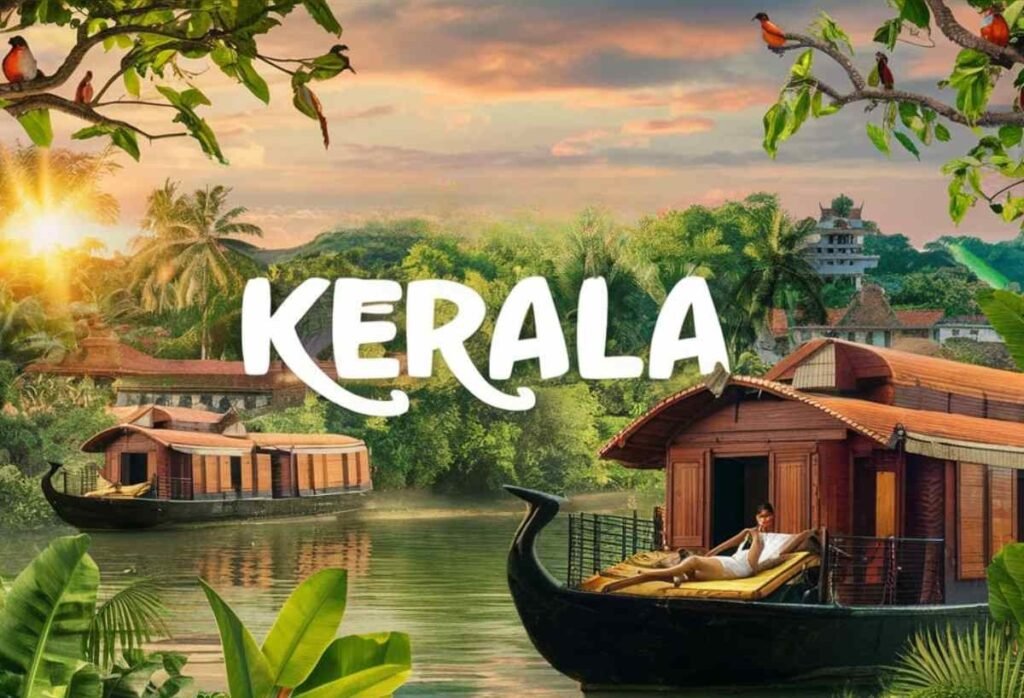Blessed with lush greenery, tranquil backwaters, golden beaches, scenic hill stations, rich culture, and a vibrant history, Kerala is a traveller’s paradise often dubbed “God’s Own Country”. From the ancient spice ports that greeted the world’s traders to modern ecotourism and wellness getaways, Kerala’s diversity makes it one of India’s top tourist destinations. In 2024 alone, the state welcomed over 2.22 crore domestic and 7 lakh foreign tourists.
Geography and Location
Kerala, set along India’s south-western Malabar coast, is bordered by the Arabian Sea and the Western Ghats mountain range. The state spans 590 km of coastline, featuring rivers, dense forests, rolling hills, scenic backwaters, and bustling urban hubs such as Kochi and Thiruvananthapuram. Kerala’s unique geography endows it with an evergreen landscape, diverse wildlife sanctuaries, and a moderate tropical climate throughout the year.
- Major Airports: Kochi (Cochin International Airport), Thiruvananthapuram, and Kozhikode.
- Major Railway Hubs: Ernakulam, Aluva, Thiruvananthapuram, Alleppey, Kozhikode.
- Well-connected by National Highways and frequent state-run/private buses.
Key Details:
History, Culture, and Tourism Development
Kerala’s documented history stretches back millennia, with Stone Age carvings in Wayanad’s Edakkal Caves indicating settlements dating back to around 5000 BC. By 3000 BC, Kerala’s spice trade attracted merchants from ancient Jewish, Arab, Chinese, Portuguese, Dutch, Roman, and British civilisations, shaping a truly multicultural society.
Modern tourism began during the British colonial era, with hill stations like Munnar and Wayanad serving as cool retreats. The state government formally recognised tourism as an industry in the 1980s and launched the famous “God’s Own Country” brand in the 1990s. Today, Kerala is a global tourism hotspot, known for its eco-tourism, Ayurveda, culture, and diverse experiences.
Economic Impact and Growth
Kerala’s tourism sector is a pillar of the state economy, generating revenue and employment. In FY25 (until February 2025), tourism revenue exceeded ₹36,683 crore (approximately USD 4.3 billion).
- In 2024, Kerala hosted over 2.22 crore domestic tourists and more than 7 lakh international travellers, setting a record. There are expectations of reaching 3 crore domestic footfalls in the 2025 peak season.
- Popular among premium travellers, families, solo explorers, and MICE (Meetings, Incentives, Conferences, Exhibitions) events, Kerala’s seamless blend of tradition and modernity appeals globally.
List of Top Tourist Places in Kerala
Below is a detailed listing of Kerala’s most popular tourist destinations, from world-famous to offbeat gems. Each offers something unique for travellers of all interests:
Must-Experience Attractions
Houseboat Cruises and Backwaters
Kerala’s intricate network of lakes, canals, and lagoons, spanning Alleppey, Kumarakom, Kollam, and Kochi, offers magical houseboat stays and peaceful canoe rides. The backwaters are best explored during winter (October–March).
Tea Plantations and Hill Stations
Munnar’s lush tea estates and misty mountains captivate nature lovers and honeymooners alike. Wayanad charms with wildlife, tribal heritage, and scenic trails through the Western Ghats. Vagamon and Thekkady are perfect for adventure and ecotourism.
Beaches and Coastal Bliss
Kovalam is famous for its crescent-shaped sands and vibrant beach resorts. Varkala’s dramatic cliffs and tranquil waves provide a unique setting for relaxation and yoga. Bekal and Kannur’s endless beach stretches are still relatively unspoiled.
Culture, Festivals, and Spirituality
Kerala’s diverse culture comes alive in its temples, churches, synagogues, and mosques. Experience the spectacular Thrissur Pooram festival, vibrant Onam celebrations, or ritualistic Theyyam performances in Kannur.
Jungle Safaris and Wildlife
Thekkady’s Periyar Wildlife Sanctuary is a top spot for boat cruises and lush rainforest experiences. Silent Valley National Park and Wayanad Wildlife Sanctuary offer glimpses of elephants, tigers, and a diverse array of birdlife.
Ayurveda and Wellness
Kerala is the heartland of Ayurveda, offering centuries-old healing traditions, rejuvenation therapies, and wellness resorts perfect for holistic experiences.
Detailed Travel Routes
Kerala’s main attractions can be experienced with carefully planned routes. Here are some popular options:
Classic Route: Kochi – Munnar – Thekkady – Alleppey/Kumarakom
- Kochi: Gateway city rich in colonial heritage and art cafés.
- Munnar: Rolling tea plantations, hiking, waterfalls.
- Thekkady: Rainforest adventures, spice plantations.
- Alleppey/Kumarakom: Backwater houseboats, bird sanctuaries, lakeside resorts.
Ideal duration: 7–8 days. Each segment is a scenic 3–4 hour drive.
Offbeat Extensions
- Add Vagamon or Wayanad for hiking and eco-resorts.
- Circle to Kovalam/Varkala for beaches and yoga.
- Head north to Kannur and Kozhikode for a stunning coastline and rich culture.
Well-connected roads, trains, and airports make Kerala easy to explore. Self-driving cars, taxis, and buses are widely available, and most tourist hubs have plenty of English-speaking tour operators.

Kerala’s Culture: Food, Art, and Ritual
Kerala cuisine is a sensory delight featuring spicy seafood, coconut-rich curries, banana leaf sadhya feasts, and iconic Malabar biryani. The state is also renowned for classical dance forms like Kathakali and Mohiniyattam; martial arts (Kalaripayattu); temple arts (Theyam, Padayani), and colourful handicraft traditions.
Annual Festivals & Major Events
Kerala’s festive spirit is unmatched, from the floral carpets and boat races of Onam to the elaborate fireworks of Thrissur Pooram and the contemporary art showcased at the Kochi-Muziris Biennale. These events attract travellers from across the globe every year.
Planning Tips and Essentials
- Best season: October to March (pleasant for sightseeing, festivals, and beach trips).
- Summer (March to May): Ideal for hill stations, with less crowding.
- Monsoon (June to September): Ideal for Ayurveda and lush green landscapes.
- Always book houseboats and eco-stays in advance, especially during holiday and festival season.
Experiences Unique to Kerala
- Stay in a treehouse in Wayanad or Thekkady.
- Witness a Theyyam temple ritual in Kannur.
- Take a sunset cruise through Alleppey’s backwaters.
- Attend the Kochi-Muziris Biennale or a traditional boat race.
- Participate in a yoga retreat on Varkala’s cliffs.
Recent News
Recent reports highlight Kerala’s soaring growth in tourist footfall, reaching new records in 2025. The state is focusing on adding innovative attractions, from the famed Kochi-Muziris Biennale and Champions Boat League to new offbeat eco-destinations, solidifying its position as India’s top travel hotspot.
FAQs About Kerala Tourism
What is the best time to visit Kerala?
The best time for pleasant weather is from October to March, while June to September suits Ayurveda retreats and monsoon lovers.
How do I reach Kerala?
Kerala has three international airports (Kochi, Thiruvananthapuram, and Kozhikode), multiple railway stations, and national highways that link all major cities.
What are the top places to explore in Kerala?
Must-visit spots include Munnar, Alleppey, Kochi, Wayanad, Thekkady, Kovalam, Varkala, Kannur, and Kumarakom.
Is Kerala safe for solo travellers and families?
Yes, Kerala is widely regarded as safe for travellers, with friendly locals and good infrastructure. Common-sense precautions apply, as in any destination.
What cuisine should I try in Kerala?
Kerala cuisine is characterised by its coconut-rich, spicy, and varied nature. Try a Sadhya (vegetarian feast), seafood curries, Malabar parotta, and local desserts.
Can I book a houseboat ride on arrival?
It is recommended to pre-book houseboats, especially during peak season, via licensed agents or online.
What is Kerala famous for?
Kerala is famous for its backwaters, Ayurveda, hill stations, Kathakali, houseboats, and unique spice-rich cuisine.
